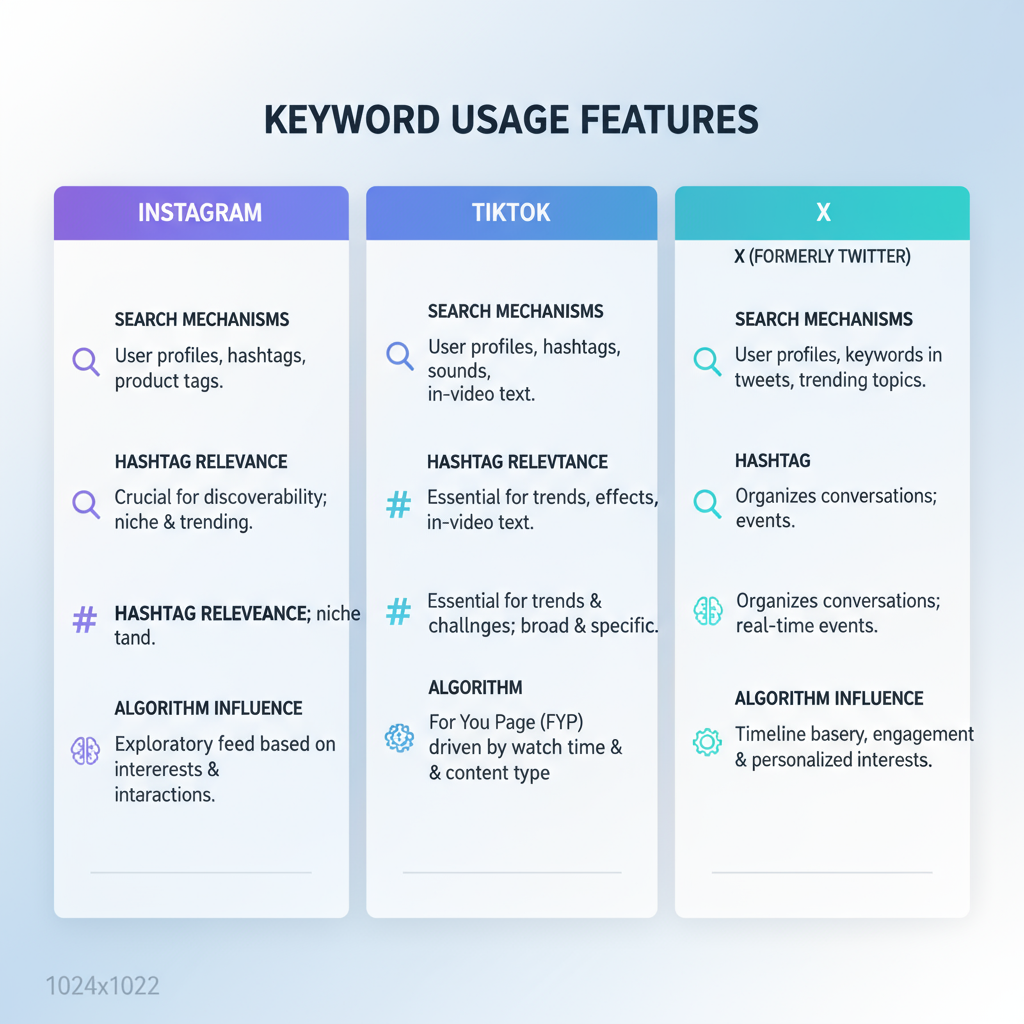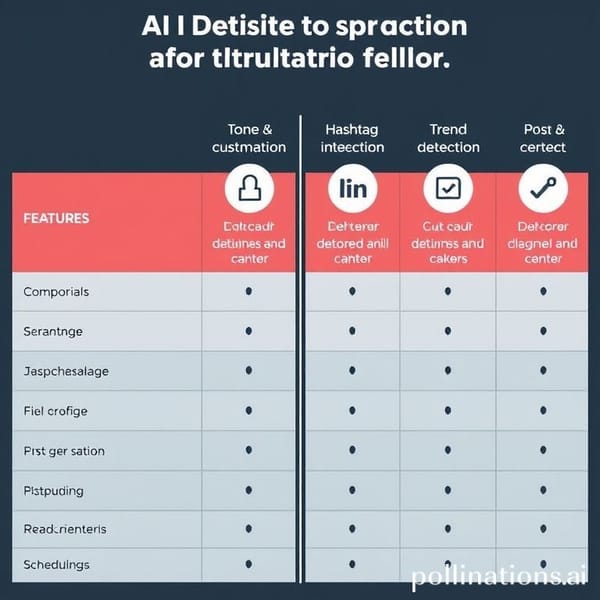What Are Keywords in Social Media and Effective Uses
Learn how to find, use, and adapt social media keywords to improve visibility, engagement, and reach across platforms like Instagram, TikTok, and LinkedIn.

Introduction to Keywords in Social Media Marketing
In the dynamic realm of social media marketing, keywords in social media act as essential connectors between your brand's content and the audience actively seeking it. Whether embedded in hashtags, captions, bios, or video descriptions, the right keywords improve visibility, boost engagement, and amplify brand recognition. Understanding how to research, apply, and adapt them to each platform can make the difference between content that fades quickly and posts that trend.

---
Defining Keywords in the Context of Social Media
In social media, keywords refer to the words or phrases that represent the main topic, theme, or subject matter of your post or profile. Just like SEO terms used for Google rankings, social media keywords ensure your material reaches users searching for related content. They can appear in:
- Captions
- Main post text
- User bios and profiles
- Video descriptions
- Alt text for images
- Hashtags
These keywords enable social platforms' search algorithms to match your posts to relevant searches, enhancing reach and discoverability.
---
Social Media Keywords vs. SEO Keywords
While SEO keywords help rank content in external search engines, social media keywords are tuned for discovery within each platform’s ecosystem.
| Aspect | SEO Keywords | Social Media Keywords |
|---|---|---|
| Purpose | Rank in search engines | Appear in platform search feeds |
| Length | Often longer (long-tail) | Can be short, trending phrases |
| Adaptability | Stable over time | Highly trend-driven |
| Placement | Page content, metadata | Captions, hashtags, bios |
Key takeaway: Social media keywords are more susceptible to shifts in trends, slang, and cultural references, while SEO keywords retain stability over longer periods.
---
Why Keywords Matter for Content Discovery and Reach
Social media keywords bridge the path between your content and targeted audiences. Done right, they deliver:
- Increased visibility: Higher chances of appearing in searches and algorithmic recommendation feeds.
- Algorithm signals: Platforms can classify your content accurately for relevance.
- Better engagement: Matched user intent translates to more likes, shares, and comments.
- Trend participation: Harnessing popular phrases boosts the potential for viral exposure.

---
How Social Platforms Use Keywords
Different networks are designed to integrate keywords in unique ways.
- Place keywords in captions, comments, hashtags.
- Include targeted phrases in bios for better profile search visibility.
TikTok
- Keywords appear in captions, hashtags, and even spoken content captured by transcription algorithms.
- Jumping on trending keyword challenges can dramatically expand reach.
Twitter (X)
- Keywords in tweet text and hashtags enhance discoverability.
- Bio keywords influence algorithmic “Who to follow” suggestions.
- Professionally relevant terms in headlines, summaries, and posts make profiles easier to find.
- Keywords in the Skills section serve as searchable attributes for recruiters.
---
Researching Relevant Social Media Keywords
Finding high-impact keywords requires insight into your audience and niche:
- Native Search Bars – Use autocomplete suggestions to identify popular terms.
- Hashtag Analysis – Track trending and niche-specific hashtags for patterns.
- Audience Language Study – Observe and adopt the vocabulary your followers use.
---
Tools for Keyword Research
Effective keyword research can be powered by both native and third‑party tools.
| Tool | Purpose | Strengths |
|---|---|---|
| Instagram Search | Native keyword and hashtag discovery | Real-time, platform-specific data |
| TikTok Trends | Identifies emerging phrases | Highly trend-driven insights |
| Twitter Explore | Shows trending topics instantly | Immediate visibility of viral terms |
| Third-party tools (e.g., Hootsuite, SEMrush) | Cross-platform discovery | Aggregated analytics and data |
---
Tips for Placing Keywords Effectively
Strategic keyword positioning ensures you appeal to algorithms and humans alike:
- Captions: Incorporate relevant terms naturally.
- Bios: Feature core niche keywords prominently.
- Alt Text: Use keyword-rich descriptions for visual content.
- Hashtags: Choose 3–10 well-researched hashtags per post.
Example Instagram Caption:
"Explore the ultimate vegan recipes 🌱 — delicious, healthy, and quick to make! #VeganRecipes #PlantBasedMeals"---
Examples of Keyword Optimization
Instagram Example
Fitness content could use:
Caption: "Easy home workout plan for busy moms"
Hashtags: #HomeWorkout #FitnessForMoms
TikTok Example
Productivity tips video might include:
Caption: "Boost your work focus with these quick tips"
Hashtags: #ProductivityHacks #WorkFromHome
LinkedIn Example
Marketing strategy post example:
Title: "Digital Marketing Strategy Trends in 2024"
Profile headline: "Helping brands grow through data‑driven campaigns"
---
Balancing Keywords With Natural Language
Keyword integration should never overpower message clarity.
Best Practices:
- Write for your audience before considering algorithms.
- Use synonyms and related phrases to keep content fresh.
- Maintain authenticity and avoid keyword stuffing.

---
Tracking Keyword Performance and Making Adjustments
Monitoring how keywords perform ensures your approach stays effective:
- Analyze impressions, reach, and engagement data.
- Compare sets of keywords to find winners.
- Adjust based on real-time analytics and trends.
---
Common Mistakes to Avoid
- Overstuffing: Diminishes readability and risks penalties.
- Ignoring trends: Leads to missed opportunities.
- Using only generic terms: Faces high competition.
- Skipping tests: Prevents data-driven strategy improvement.
---
Final Takeaways and Next Steps
Maximizing social media keyword use involves a blend of research, strategic placement, and ongoing adaptation:
- Understand your niche language.
- Research trending and evergreen terms regularly.
- Place keywords thoughtfully in captions, bios, alt text, and hashtags.
- Maintain authenticity while remaining discoverable.
- Track performance and pivot as needed.
By integrating relevant keywords consistently, you'll enhance your discoverability, engage the right audience, and strengthen your digital presence. Start by adding two or three focused keywords to your next post, and watch your reach grow over time. Ready to optimize your social media keywords strategy? Begin today to capture more attention and build community momentum.




